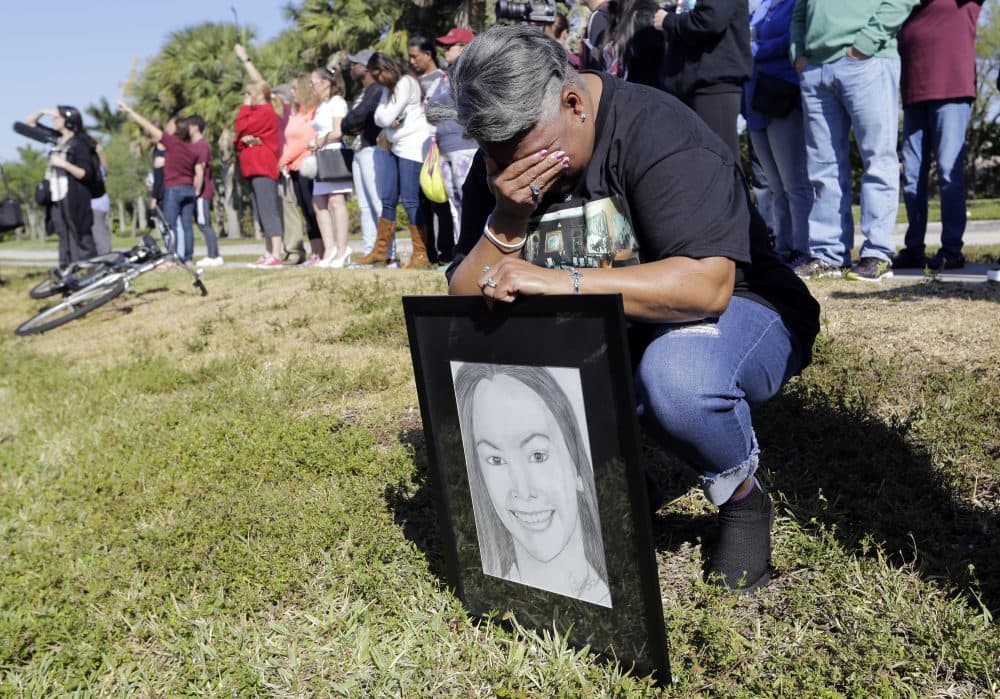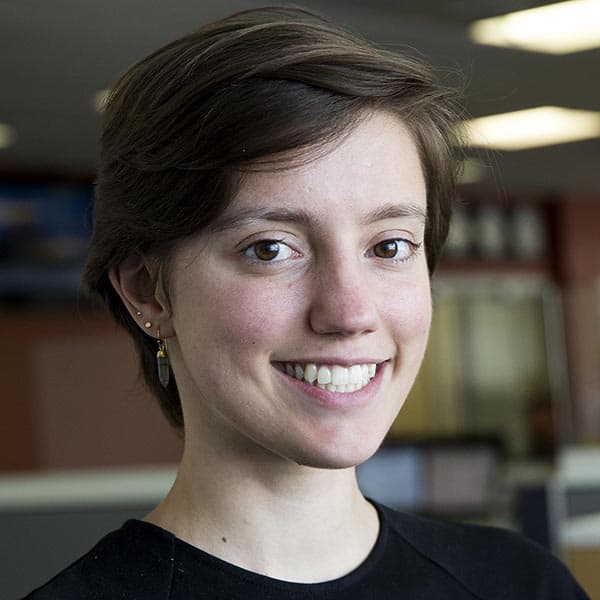Advertisement
'You're Not Going To Be The Same Person': Inside Mass Shooting Trauma Recovery

If you or someone you care about may be in crisis, please call the National Suicide Prevention Lifeline at 1-800-273-TALK (8255) or contact the Crisis Text Line by texting TALK to 741741.
Read Shiva Ghaed's book "Route 91: Healing From Mass Violence And Trauma" for free.
Two survivors of the Parkland, Florida, school shooting, and a father of a victim of the Newtown, Connecticut, shooting, died by suicide in recent days. We do not know the specific mental health challenges they were facing. Each death is an individual tragedy. But, their deaths raise critical questions.
What are the particular lasting traumas of mass violence? What supports do survivors and their families need years, decades later?
Heather Martin is the founder and chairwoman of The Rebels Project, a nonprofit that supports survivors of mass shootings. She's a survivor of the 1999 Columbine High School shooting.
Shiva Ghaed is a clinical psychologist who specializes in trauma and anxiety disorders. She's a survivor of the 2017 shooting at the Route 91 Harvest Music Festival in Las Vegas.
Together, they shared insight into the recovery process for survivors, the stigma surrounding mental illness and whether or not support has improved since the tragedies of Columbine.
"Have things changed in terms of knowledge level? I'm not so sure,
Ghaed says. "I don't want to be discouraging here. But I think, unfortunately, this is a systemic and comprehensive change that will need to occur just on a societal level. There is incredible stigma about mental illness. And I think that stems from incredible ignorance. There is a complete lack of understanding."
Interview Highlights
On first reaction to the deaths by suicide in the last week
Martin: "When the news came out about the Parkland students, it was incredibly upsetting because we try to do as much outreach as possible and let people know that there are services and there are things that they can do so that they don't feel so alone. We were devastated, and then learning about [Jeremy Richman, whose daughter was killed at Sandy Hook] was terrible. Jeremy is a friend, and I just never — I mean, I don't want to sound textbook, but, you know, I never would have expected it knowing him. And it's just really rough on the survivor community as a whole."
Ghaed: "I'm just profoundly saddened by news like this. Every time a new shooting is announced, and especially when the Borderline shooting occurred, it's like everybody relives it all over again. It just adds insult to injury. And so it's devastating. And also being a professional in this field, it's — you do what you can and, like Heather and her organization, you do what you can and sometimes it's just not enough to keep everybody safe."
On where they're at in their respective healing processes
Ghaed: "Well that's a really great question, and I think if you had asked me that question at different points along the past year and a half, my answer would have been different. The few months following the trauma, like everyone else, I had significant trauma symptoms. By about the fourth month I felt a lot better — maybe not quite back to normal, but a lot better and functioning well. I was also very busy, and that's kind of a classic strategy for avoidance, although I wasn't intentionally avoiding. I was trying to support the community how I could. I realized that that may have slowed down some of my own processing, because following the one year, when our social support groups ended, and then not even three weeks later the Borderline shooting occurred, I was very, very severely triggered and I had to take some time off to process that for several days. At this point I think it's up and down. I think overall I'm doing well, but I notice a lot more mood lability and sensitivity, especially with news of mass shootings and the related consequences like suicides."
"Because I wasn't physically injured, I never really thought that I had a right to be traumatized or to feel the way that I did, which I think is really common."
Heather Martin, Columbine shooting survivor
On the question of "fully healing" from these traumas
Martin: "I guess the term 'fully healed' is kind of ambiguous, because you really do need to come to terms with the fact that you're not going to be the same person that you were before. And the term 'the new normal' is thrown around a lot. And I've talked to some of my Aurora theater survivor friends, and they were so sick of hearing it in the aftermath. But when I heard it, it was nine years after the shooting at Columbine, and it changed my life. I was like, 'Oh, my gosh. You're right. That's what I've been dealing with all these years.' For me, because I was a senior, I graduated and kind of went off to college and I didn't have a support system. And it's 1999, so I know that the school was sending out letters to our parents, maybe some emails, but just different ways of outreach in 1999 with the changes in technology. A lot of the class of '99 really just felt lost. We didn't have a system of support in place. We went off to college, moved away, and it was a huge struggle for me.
"I also worked a lot to try to keep busy. I was a full-time student and I worked three jobs. I developed an eating disorder as a result of it. I think it was really just me trying to get control of my life in some way. I did seek professional therapy a year later and that was really great for me — I just noticed that I wasn't attending class, I was struggling with eating and it really changed the way I looked at my trauma. Because I wasn't physically injured, I never really thought that I had a right to be traumatized or to feel the way that I did, which I think is really common. We try to minimize our trauma because we weren't at this place, or we didn't see this, or we weren't physically injured. And that's really, really dangerous and can lead to really dangerous places."
On encountering people dismissive of the trauma
Martin: "It was two different professors, both my English professors and the first one — I don't remember the assignment exactly. I know that the essay needed to be an argument essay, and I understand, as a teacher now, you want to choose a topic that's hot in the news, but it was something that had to do with gun violence in schools or gun laws. And I approached her and I was so nervous to approach her because I didn't really like to out myself as being at Columbine. And I was like, 'Hey, I can't write this paper, I was at Columbine.' And think about it: You're looking through the lens of an 18-year-old, traumatized teenager. The response that I heard was just like, 'Well, you're going to have to write the essay or else you're going to fail.' And I did fail that class."
"I think one thing that has improved over the past two decades is the research on PTSD and the understanding about trauma disorders, anxiety disorders, mood disorders. However, I am not sure I can speak to whether things have gotten better."
Shiva Ghaed, psychologist and survivor of the 2017 Las Vegas shooting
On whether we as a society have gotten better at supporting survivors
Ghaed: "That's a really tough question. I think one thing that has improved over the past two decades is the research on PTSD and the understanding about trauma disorders, anxiety disorders, mood disorders — all of those co-morbid psychiatric illnesses. However, I am not sure I can speak to whether things have gotten better. I mean, that's probably very dependent on the individual and the resources that each individual has reached out for. I will say again, I think providers are a little bit more knowledgeable now. However, I will say that doesn't necessarily mean that the population at large is knowledgeable.
"And I think, specifically as it relates to Route 91, this was just a massacre on such an enormous scale and the survivor community is just spread all over the United States, and even outside of the United States. People have been reaching out to me from all over the world and the United States over the past year and a half, sometimes asking for guidance, sometimes just sharing what they're going through, asking about where there are support groups. There are a lot of people that live in small towns or live in areas that just don't have adequate care or access to psychiatrists and psychologists, much less trauma-informed therapies. So it's a really challenging thing, because this sort of begs a much bigger question, which is do we actually have the infrastructure to support these kinds of events? And certainly one would hope that we don't have to always deal with a survivor base of 22,000 people, but there's kind of a known shortage of psychiatrists and psychologists in the country, and certainly those that are really competent in treating trauma specifically."
Alex Schroeder adapted this interview for the web.

